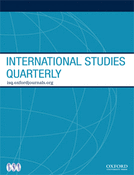-
PDF
- Split View
-
Views
-
Cite
Cite
John R. Oneal, Bruce M. Russet, The Classical Liberals Were Right: Democracy, Interdependence, and Conflict, 1950–1985, International Studies Quarterly, Volume 41, Issue 2, June 1997, Pages 267–293, https://doi.org/10.1111/1468-2478.00042
Close - Share Icon Share
Abstract
The liberals believed that economic interdependence, as well as democracy, would reduce the incidence of interstate conflict. In this article, we test both their economic and their political prescriptions for peace, using pooled-regression analyses of politically relevant dyads for the Cold War era. We find that the pacific benefits of trade, both total and dyadic, have not been sufficiently appreciated. We also offer clear evidence that democracies are relatively unlikely to become involved in militarized disputes with other democracies, while autocracies and democracies are prone to conflict with each other. Since democratic dyads are more peaceful than autocratic dyads, it follows that democracies are more peaceful than autocratic states generally, ceteris paribus. Previous research at the national level of analysis, which led most to conclude that democracies have been no more peaceful than other states, did not consider that the incidence of conflict depends importantly upon the number of contiguous states, the character of their political regimes, and other factors. In addition, we find no evidence that states that have recently undergone regime changes, whether in the democratic or autocratic direction, are particularly conflict prone. Our results suggest the basis for a broader formulation of expected–utility theories of interstate conflict.



